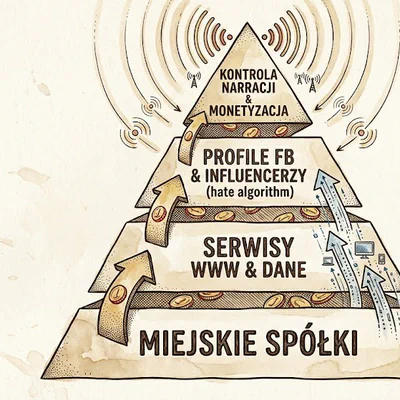Analysis of technical tracking and monetization mechanisms using the LODZ_PL portal as an example reveals an extensive advertising architecture that goes far beyond the informational function of a municipal service. The article presents a detailed mechanism for data transfer between various municipal domains and potential conflicts of interest arising from the commercialization of local government information space.
Table of Contents
Watchdog organizations fight against “government newsletters,” one element of which is the functioning of municipal portals as advertising tools. In Łódź, there operates a real media conglomerate in the form of the LODZ.PL service, which the Municipal Office of Łódź delegated to be managed by the municipal library. During my own analysis, I discovered extensive advertising systems and advanced user tracking mechanisms there. Fighting propagandist content in local government media is difficult because they serve as a “vehicle for maintaining power,” while the strategy of examining the advertising ecosystem may bring concrete results. These mechanisms, although technically possible and common in internet marketing, raise serious doubts when applied on such a scale on a portal financed with public money. An open question is potential rights violations that could be verified through UODO (Personal Data Protection Office) inspection.
For 2 years, I have been collecting information about lodz.pl, also scanning the MPU service and selected services within UMŁ. Two months ago, I conducted a detailed review of the lodz.pl service. I have also been observing for some time disturbing and probably applied SEO heist and hate algorithm practices, most likely used by external specialists hired to boost the position of the entire service in search results. In recent years, particularly in the last year, intensive cooperation with influencers promoting tourism and “event city” - concerts and similar attractions is visible. At the same time, greenwashing is being conducted, including false information about tree plantings, which I verified by confronting GUS data and other publicly available statistics with content published on LODZ.PL. However, the time will come for these issues too…
In this article, I analyze the case of Łódź’s municipal portal as an example of a phenomenon that probably occurs in many other Polish local governments. I hope this will become an inspiration for broader audits and dismantling of the conglomerate that draws internet traffic to one source, where simultaneously, according to my best knowledge, new development investments are promoted and success propaganda is practiced. This raises questions about potential favoritism toward specific companies and industries. I hope that organizations like Watchdog Poland will undertake a more thorough clarification of these issues.
Non-standard and Advanced Advertising Architecture
The first alarm signal is the technical structure of the service itself, specifically its scale. Analysis of the LODZ.PL header code reveals an extensive tracking and monetization system that decidedly exceeds the needs of an informational municipal portal:
| |
I identified at least seven different tracking systems on one page:
- Custom advertising server (
ads.biblioteka.lodz.pl) - non-standard solution managed by the Municipal Library - Older version of Google Analytics (UA-25825547-40) - result of chaos, as this method hasn’t worked for several months
- Newer version of Google Analytics (G-30F084ZHSL)
- Google Tag (GT-5DH5KDR)
- Facebook Pixel (ID: 528537619394728)
- Microsoft Clarity (ID: jnbug4lfqt)
- Second Microsoft Clarity (ID: kptfdqvgz7)
- Google AdSense (Publisher ID: ca-pub-6662457014686579)
Deeper analysis of the library’s advertising server code (asyncjs.php) indicates the use of a professional advertising system based most likely on Revive Adserver (formerly OpenX):
| |
This indicates a professional and centralized approach to advertising management. Delegating this task to the library is unusual and worth investigating in terms of transparency and purposefulness.
Explanation of How Conversion and Optimization Mechanisms Work
I would like to briefly explain the money flow and optimization control. If we have a portal where ads are placed, we can segment ads for the target recipient based on their earnings, demographics, etc., but primarily their interests, meaning collected information that they are, for example, looking for an apartment. This way, if we have people aged 30-40 from Łódź or the area interested in real estate, we can set higher rates for conversions (success is clicking on an ad and valued activity, e.g., filling out a contact form or signing up for a newsletter).
I want you to understand what this is about - we can, for example, price the development segment higher, thus controlling money flow and boosting this segment, or price the HORECA segment related to tourism and the event industry higher. You’ll ask: well, but how does this work, it’s not UMŁ that prices. That’s true, advertisers price, but UMŁ provides advertising space, but through content optimization, page structure, and semantic analysis, we not only collect knowledge about users, but we can also make our landing pages more attractive to certain industries. In practice, this means that a municipal portal can indirectly direct more traffic and revenue to selected business sectors. That’s why I’m showing these mechanisms and the considerable scale, because I hope that Watchdog organizations will explain this aspect and it won’t just break down to explanations that this is how marketing works.
Cross-Domain Tracking Mechanisms
Particularly disturbing is the mechanism of potential data transfer between different municipal domains, including BIP and municipal company websites. Google Tag Manager and related technologies enable user tracking through so-called cross-domain tracking:
flowchart TD
User([User]) --> LODZPL[lodz.pl]
User --> BIP[bip.uml.lodz.pl]
User --> Company[domain.lodz.pl]
subgraph Tracking["Tracking Mechanisms"]
direction LR
GTAG[Google Tag Manager]
GA[Google Analytics]
FB[Facebook Pixel]
MS[Microsoft Clarity]
ADS[Google AdSense]
LIB[ads.biblioteka.lodz.pl]
end
LODZPL --> Tracking
BIP --> Tracking
Company --> Tracking
Tracking --> Profile[User Profiles]
Profile --> Remarketing[Remarketing]
Remarketing --> Ads[Targeted ads for specific segments e.g. new apartments]
style User fill:#e2e3e5,stroke:#212529
style Tracking fill:#f8d7da,stroke:#dc3545
style Profile fill:#fff3cd,stroke:#ffc107
style Remarketing fill:#fff3cd,stroke:#ffc107
style Ads fill:#d4edda,stroke:#28a745
This mechanism enables:
- Identification of the same user across different municipal domains
- Building behavioral profiles based on information from BIP, municipal portal, and company websites
- Creating remarketing lists and user segmentation (e.g., “interested in housing investments”)
- Transferring this data to advertising systems Google Ads and Facebook Ads
In short, such data transfer is needed so that in case of clicking on an ad, we can track and optimize ads. Conversions (clicking and potential form filling on the developer’s site, or product purchase) realized on one portal must be transferred if the client entered from another service. That’s why data is transferred. Such advanced tracking and ad optimization is used by companies for which advertising, conversions, and monetization are important elements.
In the context of a public portal, this raises questions about the scope of collected data and its use, especially if it includes interactions with purely informational services like BIP.
Microsoft Clarity - Invisible Session Recording
Particular doubts are raised by the presence of two Microsoft Clarity instances – a tool that records user sessions, registering mouse movements, clicks, and page scrolling. The average resident using the municipal portal probably has no awareness that their interactions are being recorded in detail. The existence of a double instance indicates either intensive optimization activities conducted by different entities, or a lack of coordination in service management. Microsoft Clarity, providing detailed data through session recording and heat maps, is a tool typical for commercial websites focused on conversion optimization. Its implementation on a municipal portal without clear information in the privacy policy raises serious doubts from the perspective of GDPR and protection of residents’ personal data.
Potential Conflicts of Interest and SEO HEIST Strategy
Another disturbing phenomenon is the probable use of the SEO HEIST strategy – a technique of capturing search traffic for popular phrases related to various content segments, then directing this traffic to specific pages. It’s no coincidence that in LODZ.PL, ads mainly concern new development investments, which raises questions about potential conflicts of interest. I’m not suggesting anything here. I would like someone to ask UMŁ about these issues and examine to what extent it captures traffic from traditional media.
The issue for audit is whether people responsible for creating municipal portal content optimize it for search phrases broadly enough to maximize traffic and simultaneously take traffic from traditional media. Is this related to optimization for specific segments?
Key Questions Requiring Answers
In the context of the above findings, several questions should be asked regarding the functioning of the advertising system on the LODZ.PL portal:
1. Advertising Finances
- What is the total amount of Google Ads revenue achieved by the LODZ.PL portal in the last 3 years?
- How is this revenue distributed across individual advertising categories?
- Are advertising revenues reinvested in portal development, or transferred to the municipal budget or other entities?
2. Targeting and Profiling
- What user segments are targeted by ads broadcast on LODZ.PL?
- Does the city use residents’ demographic data to optimize ads?
- Is retargeting of users between municipal portals used?
- Is targeting also used within BIP and municipal company information sites?
- Does the city collect and use users’ behavioral data for ad personalization? (remarketing, audience groups, etc.)
3. Advertising Strategies
- Which industries/business sectors are most frequently promoted through ads?
- Are there preferential rates for specific types of advertisers?
- Does the portal create special articles for ads (SEO HEIST strategy), so as to capture traffic from traditional media and create one consumption channel?
4. Management and Subcontractors
- Which external entities are involved in ad management?
- What are the terms of contracts with these entities?
- Do these entities simultaneously handle advertising campaigns for local development leaders and infrastructure companies?
5. Transparency
- Is there an official portal advertising policy determining what ads can be broadcast?
- What is the decision-making process regarding advertising campaign acceptance? Keywords and optimization?
- Do “black lists” of companies/institutions and domains whose ads are not accepted function?
If a municipal portal, financed from public funds, actively competes with private media for internet traffic, to then monetize it through ads for specific industries, this may lead to conflicts of interest and favoritism toward some economic entities. Promoting development investments disproportionately on a municipal portal that should serve all residents is ethically questionable.
Legal Concerns
The described practices raise serious legal concerns, particularly in the context of GDPR:
- GDPR Compliance - Do users give informed consent to such extensive tracking?
- Public vs. Commercial Purposes - Should information from BIP (which has an informational purpose) be used for advertising purposes?
- Transparency - Does the city inform about such practices in a way understandable to the average user?
- Sponsored Content Labeling - Are articles optimized for SEO, promoting specific investments, properly labeled as sponsored content?
Summary
The LODZ.PL portal, instead of serving mainly an informational function, has been transformed into an advanced advertising platform with extensive user tracking and profiling mechanisms. Such a model of operation raises fundamental questions about the boundaries of commercializing local government information space and about potential conflicts of interest.
As the example of Łódź shows, it’s worth expanding watchdog activities beyond traditional fighting against “government newsletters” and directing them also to examining advertising systems and monetization of municipal portals. It’s precisely in these mechanisms that the most serious pathologies at the intersection of power and business may be hidden.
If you have experience in Google Ads, online marketing, or data security, extensive knowledge about advanced SEO-spam techniques, SEO heist, and triggering the “hate” algorithm and would like to share your knowledge or observations regarding similar practices in other local governments, I encourage you to contact info at dadalo.pl
Advertising Managed by Łódź Media Group - Łódź Tourism Organization
Analysis of flows and connections between the LODZ.PL portal and the advertising system reveals another element. Portal advertising is managed by an entity called “Łódź Media Group,” which is part of the Łódź Tourism Organization.
From analysis of the Łódź Media Group promotional page, it appears that this company has enormous personal data resources of residents and effectively combines various advertising channels:
“The personal data we possess and related profiling possibilities come from the Łódź Resident Card system and the Łódź.pl application, of which we are the exclusive operator.”
Łódź Media Group openly boasts about user targeting capabilities:
- 84,000 active users of the Łódź.pl application with “full target group targeting based on criteria such as: gender, age, interests, family structure, residence”
- 150,000 email addresses with full targeting capability
- 145,000 phone numbers also with targeting option
- Portal łódź.pl with 1 million monthly users and 8 million page views
Meanwhile, the formal publisher of the LODZ.PL portal is the Municipal Library in Łódź (Freedom Square 4), creating a complex dependency structure:
- Municipal Library as portal publisher
- Łódź Media Group as advertising operator
- Łódź Tourism Organization as parent entity for Łódź Media Group
This arrangement confirms earlier hypotheses about non-obvious connections between various municipal entities in data and advertising management. Particularly disturbing is the fact that data from the Łódź Resident Card (city loyalty program) is used for advertising profiling.
This raises additional questions about GDPR compliance, as Łódź Resident Card users were probably not aware that their data would be used this way by an external commercial entity. Recently, activists criticized that SMS messages to Łódź Resident Card participants included ads for development investments.
Comparison of Cookie Consent Requirements on LODZ.PL Portal vs. Actual Tracking
| Cookie policy consent category | Number of providers | Actually implemented on LODZ.PL | Compliance |
|---|---|---|---|
| Store information on device | 118 providers | Google Analytics (UA-25825547-40, G-30F084ZHSL), Google Tag (GT-5DH5KDR), Google AdSense (ca-pub-6662457014686579), Facebook Pixel (528537619394728), Microsoft Clarity (jnbug4lfqt, kptfdqvgz7), ads.biblioteka.lodz.pl | ❌ No information about Microsoft Clarity |
| Use limited data to select ads | 71 (consent) 30 (legit. interest) | Google AdSense, ads.biblioteka.lodz.pl | ✓ Compliant |
| Create profiles for personalized ads | 96 providers | Google Analytics, Google Tag, Facebook Pixel | ✓ Compliant |
| Use profiles to select personalized ads | 91 providers | Google AdSense, Facebook Pixel | ✓ Compliant |
| Create profiles for content personalization | 28 providers | Microsoft Clarity (2 instances) | ❌ No information about session recording |
| Use profiles to select personalized content | 24 providers | Microsoft Clarity (2 instances) | ❌ No information about session recording |
| Measure ad effectiveness | 78 (consent) 43 (legit. interest) | Google Analytics, Facebook Pixel | ✓ Compliant |
| Measure content effectiveness | 33 (consent) 13 (legit. interest) | Google Analytics, Microsoft Clarity | ❌ No information about session recording |
| Link different devices | No information about number | Google Analytics, Facebook Pixel, Google Tag | ✓ Compliant |
| Identify devices based on automatic information | No information about number | Google Analytics, Google Tag, Facebook Pixel | ✓ Compliant |
List of Providers Listed in LODZ.PL Portal Cookie Policy
- Exponential Interactive, Inc d/b/a VDX.tv
- Roq.ad GmbH
- AdMaxim Limited
- Index Exchange Inc.
- Quantcast
- BeeswaxIO Corporation
- Sovrn, Inc.
- Adikteev
- RTB House S.A.
- The UK Trade Desk Ltd
- Nexxen Inc.
- Epsilon
- Yahoo EMEA Limited
- ADventori SAS
- Triple Lift, Inc.
- Xandr, Inc.
- NEORY GmbH
- Nexxen Group LLC
- NEURAL.ONE
- ADITION (Virtual Minds GmbH)
- Active Agent (Virtual Minds GmbH)
- Taboola Europe Limited
- Equativ
- Adform A/S
- Magnite, Inc.
- RATEGAIN ADARA INC
- Sift Media, Inc
- Rakuten Marketing LLC
- Lumen Research Limited
- OpenX
- Yieldlab (Virtual Minds GmbH)
- Roku Advertising Services
- Nano Interactive Group Ltd.
- Simplifi Holdings LLC
- PubMatic, Inc
- Comscore B.V.
- Flashtalking
- PulsePoint, Inc.
- Smaato, Inc.
- Semasio GmbH
- Crimtan Holdings Limited
- Genius Sports UK Limited
- Criteo SA
- Adloox SA
- Blis Global Limited
- Lotame Solutions, Inc
- LiveRamp
- GroupM UK Limited
- LoopMe Limited
- Dynata LLC
- Ask Locala
- Azira
- DoubleVerify Inc.
- BIDSWITCH GmbH
- IPONWEB GmbH
- NextRoll, Inc.
- Teads France SAS
- Ströer SSP GmbH (SSP)
- OS Data Solutions GmbH
- Permodo GmbH
- Platform161 B.V.
- Basis Global Technologies, Inc.
- SMADEX, S.L.U.
- Bombora Inc.
- EASYmedia GmbH
- Remerge GmbH
- advanced store GmbH
- Magnite CTV, Inc.
- Delta Projects AB
- usemax advertisement (Emego GmbH)
- emetriq GmbH
- Publicis Media GmbH
- M.D. Primis Technologies Ltd.
- OneTag Limited
- Cloud Technologies S.A.
- Smartology Limited
- Improve Digital
- Adobe Advertising Cloud
- Bannerflow AB
- TabMo SAS
- Integral Ad Science (incorporating ADmantX)
- Wizaly
- Weborama
- Jivox Corporation
- Sojern, Inc.
- Vistar Media EMEA BV
- On Device Research Limited
- Rockabox Media Ltd
- Exactag GmbH
- Celtra Inc.
- mainADV Srl
- Gemius SA
- The Kantar Group Limited
- Nielsen Media Research Ltd.
- Solocal SA
- Pixalate, Inc.
- Numberly
- AudienceProject A/S
- Demandbase, Inc.
- Effiliation / Effinity
- Arrivalist Co.
- Seenthis AB
- Commanders Act
- travel audience GmbH
- HUMAN
- Blendee srl
- Innovid LLC
- Papirfly AS
- Neustar, Inc.
- Verve Group Europe GmbH
- Otto GmbH & Co. KGaA
- Adobe Audience M





